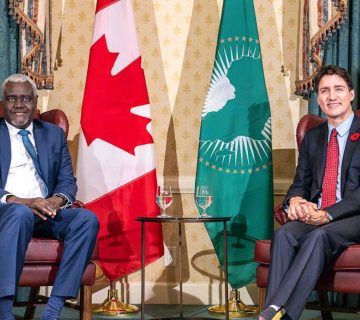Prior to the bombing of the American embassy in Nairobi, in 1998, there were less than half a dozen cases of terror attacks in Kenya. Since then, there have been numerous terror related attacks with hundreds of causalities. The situation is even worse in Somalia and Nigeria whose population has suffered immensely.
Al Shabab’s persistent attacks in the Horn of Africa, Boko Haram and al Qaeda’s attacks in Nigeria and Sahel region have brought the focus of counter-terrorism to the continent. Insurgent groups have increasingly inflicted terror on the bodies, hearts, and minds of millions of people in Africa and around the world. Research has shown that a blend of push and pull factors such as social, political, economic ideological, religious, and group dynamics have exacerbated Africa’s susceptibility to terrorism and violent extremism. Yet, most African governments have been easy-going in addressing some of these disparities as part of their counter-insurgency approaches.
The gravity of terror cannot be underestimated, and this demands that leaders and other stakeholders build a momentum in the fight against terrorism, even as Daesh faces defeat in the Middle East. As a transnational threat, no single nation will be able to wipe out terrorism. Consequently, locating points of convergence in countering terrorism should be given priority especially in Africa.
About the International Conference on Terrorism and Violent Extremism
On 24-26 April 2018, scholars, practitioners, government officials, and representatives of foreign governments converged in Nairobi to exchange ideas and experiences in countering terrorism in Africa. The theme of the conference The Changing Dynamics of Terrorism and Violent Extremism in Africa: Towards Effective Prevention and Counter-Terrorism Strategies justifiably echoed the need to refine and align the current counter-terrorism strategies to match the evolving terror groups’ tactics. The conference organized by the HORN International Institute for Strategic Studies, a think tank based in Kenya, provided a platform for candid conversations on effective ways of preventing violent extremism.
Countering Violent Extremism: the Missing Link
At this conference, speakers stressed the importance of African-led approaches in tackling the threat of terrorism, with some of them calling for more innovative ways of gathering intelligence. Prof. Amutabi, Vice Chancellor at Lukenya University, and an expert in peace security explained why it is imperative to institute informal security early warning systems in Africa. Establishing or enhancing networks – formal and informal – of alert to detect in real time the breach of security or threat to security will increase the chances of foiling terror attacks.
In advocating for a soft approach, Prof. Amr Abdalla, Vice Rector at the United Nations-mandated University for Peace (UPEACE) and prosecuting attorney in Egypt in the 1980s emphasized the need for an improved relationship between security forces and leaders of Islamic jihad in sustaining the doctrine revisions process. “That deep commitment and religious conviction deserve a pause in order to better understand the wider motivation towards violent extremism in the name of Islam, which is not captured by the doctrine revisions process or current counter-narrative efforts,” Prof. Abdalla said. A better relationship between the two groups can give way to an honest conversation, but there should be caution not to yield to excessive demands of extremists.
Prof. Horace Campbell, Kwame Nkrumah Chair of African Studies in the University of Legon, Ghana, argued that the war on terror has become a business, and challenged the audience to confront the known and/or suspected financiers of terrorism, particularly in the Horn of Africa, to help prevent or counter violent extremism in Somalia. He called for the use of the continent’s resources in reconstruction and development, as opposed to spreading terror in the region.
Ambassadors from over 15 countries also got a chance to explain to the participants own country experiences. From their discussion, it is apparent that the threat of terrorism is real, but there are conscious efforts to eradicate it in their respective countries. A closer examination reveals that some countries in Africa have made remarkable progress in the campaign against insurgency. Cooperation, therefore, is vital, particularly in learning and improving on individual countries’ counter-terrorism approaches.
Explaining the role of National Police Service in preventing terrorism and violent extremism in Kenya, Inspector General of Police, Joseph Boinett said that “The psychosocial approach has continued to target individuals who are vulnerable to violent extremism, especially those who have returned from Somalia or other terrorism-prone areas or have been in direct contact with violent extremists.” Of note, there are no records yet of a tangible threat of fighters returning home, but whatever their reason for abandoning their mission abroad should be cautiously examined. Such programs as those initiated by National Police Service are a big step towards sustainable counter-terrorism in Kenya. On his part, H.E. Amb. Dr. Martin Kimani, Special Envoy, and Director of Kenya’s National Counter Terrorism Centre challenged the scholars to delve into the root causes of terrorism, identity and sense of belonging to a terror group.
Way Forward
The participants and presenters at the conference proposed that debate on terrorism should be expanded to cover a wider range of issues including military, intelligence, ethnic identity, and their linkages to extremism among others. Additionally, strategies aimed at extinguishing terror networks through elimination of key figures in the network are unlikely to bring about real and lasting transformation. It was also noted that the war on terror is not a job which can be done by one single entity, it requires coordination from a wide spectrum of national and international agencies.
However, a prerequisite for success in this war is good governance. Weak governance structures in some African countries have provided a basis for emergence and proliferation of terrorist groups. Corruption, poor public service delivery, in addition to human rights abuses have fuelled disaffection with governments pushing the people, especially the youth, to join terror groups according to UNDP report Journey To Extremism In Africa. Improved governance manifested in accountability and transparency will endear itself to the masses, and hence, considerably diminish the allure to join terror groups.
Daniel Iberi is the Strategic Communications Manager, the HORN Institute.



